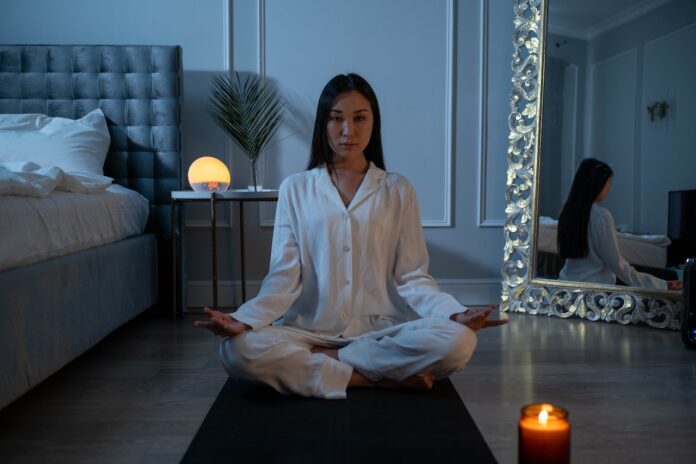10 tips for reducing stress before bed
In June this year, a survey was conducted by the Royal College of Physicians (RCP) on how the rising cost of living damages the nation’s health. The survey concluded that 55% of British people blame the cost-of-living crisis for deteriorating health. Of those, 16% cited stress.
High stress levels can impair sleep by prolonging the time it takes to fall asleep and making it less likely that the recommended seven to nine hours of sleep is achieved. This lack of sleep can induce further stress, causing a cycle of poor sleep, feelings of anxiety and stress.
With this in mind, sleep experts at Bed Kingdom decided to look into the effects of stress on a person’s sleep and well-being and provide ten ways to reduce stress before going to bed.
How can stress affect my sleep and well-being?
Chronic stress can cause the nervous system to stay in a heightened state of arousal for extended periods. This state can severely impact physical and mental health. Sleep deprivation is a common side effect of stress, as being in a heightened state of alertness can delay a person falling asleep. Below are the common symptoms associated with a lack of sleep:
- Impaired memory
- Excessive daytime sleepiness
- Lack of alertness
- High blood pressure
- Depression
- Lower sex drive
- Reduced immune system and function
How can I de-stress at night?
Lowering stress levels in the evening and before bedtime is imperative for good quality sleep. Below is a list of lifestyle changes you can make to help reduce your stress levels:
1. Exercise an hour before bed
A 2017 study appearing in Psychiatry Research published that physical exercise effectively reduces stress and anxiety symptoms. Further evidence suggests that sleep quality is improved in those with sleep difficulties who exercise before bed—taking a walk an hour before bed will reduce stress and aid digestion, and enhance the quality of sleep.
2. Tidy up
Organising and cleaning the space around you will de-clutter your mind and help to reduce stress. Studies have shown that people with more clutter in their bedrooms take longer to fall asleep than those with a tidy room.
3. Put your phone on ‘Do not disturb’
Shutting off your phone or setting it to ‘do not disturb’ will eliminate distractions and stop constant buzzing and notifications from social media and texts. Turning your phone off completely is more effective as the blue light from your phone has been known to suppress the body’s release of melatonin, the sleep hormone.
4. Avoid caffeine and try a sleepy tea
Consuming caffeine should be avoided in the afternoon to allow you to sleep. There are some tremendous sleep-inducing teas that many swear by to help them drift off. Aldi sells an 85p box of ‘Diplomat sleep’ tea containing camomile, vitamin B3, niacin and passion flower that has been reported to help those who have insomnia to get to sleep at night.
5. Take a warm shower or bath
Having a warm shower or bath 90 minutes before bed may help you fall asleep more quickly. A study by The University of Texas analysed the link between sleep quality and bathing to find that the resulting drop in body temperature encouraged sleep ten minutes quicker than in the control group. Bathing in water between 40-43°C/ 104-109°C made for the best results.
6. Lavender oil
The inhalation of lavender before bed increases the percentage of slow-wave (deep) sleep. Lighting a lavender-scented candle and using a lavender spray or oil on your pillow can help you to de-stress and calm you down.
7. Write down a to-do list for the next day
Worrying about what you are doing tomorrow will spike stress hormones and delay your sleep. To avoid this, try writing in your journal or a notebook what you plan to do the next day, as well as any thoughts you want to remember tomorrow but want to remove from your mind to help you to relax.
8. Mindfulness and meditation
Research on 3,515 participants has shown that practising mindfulness led to small-to-moderate improvements in anxiety, stress and depression. Using gentle breathing techniques commonly used in yoga and tai chi is effective in aiding relaxation and reducing cortisol levels, otherwise known as the stress hormone.
9. Focus on something positive
Thinking of something that makes you happy or doing something you enjoy before bed can release endorphins, otherwise known as the pleasure hormone. As the levels of endorphins rise, the cortisol levels will drop, causing your feelings of stress to be replaced with positivity.
10. Keep to a bedtime routine
Sticking to a routine that may encompass a few or all of the above tips can help you to establish a consistently good night’s sleep. Starting your routine at the same time every night will trigger your mind to begin relaxing, and you will soon forget about the stresses experienced during the day.
An expert from Bed Kingdom commented on the study:
“The cost-of-living crisis is sure to have a detrimental impact on stress levels in the UK and the quality of sleep. Adopting a relaxing nighttime routine before bed can help ease stress levels and aid a good night’s sleep. If you don’t allow yourself time to rest and reset, the next day may be filled with even more stress, and the cycle could continue.
Turning off your phone, drinking a sleepy tea, having a bath and writing down your thoughts can all help you feel less stressed and will, in turn, aid a better night’s sleep.”
Source: https://www.bedkingdom.co.uk/ , who conducted the research.
Help keep news FREE for our readers
Supporting your local community newspaper/online news outlet is crucial now more than ever. If you believe in independent journalism, then consider making a valuable contribution by making a one-time or monthly donation. We operate in rural areas where providing unbiased news can be challenging. Read More About Supporting The West Wales Chronicle






















